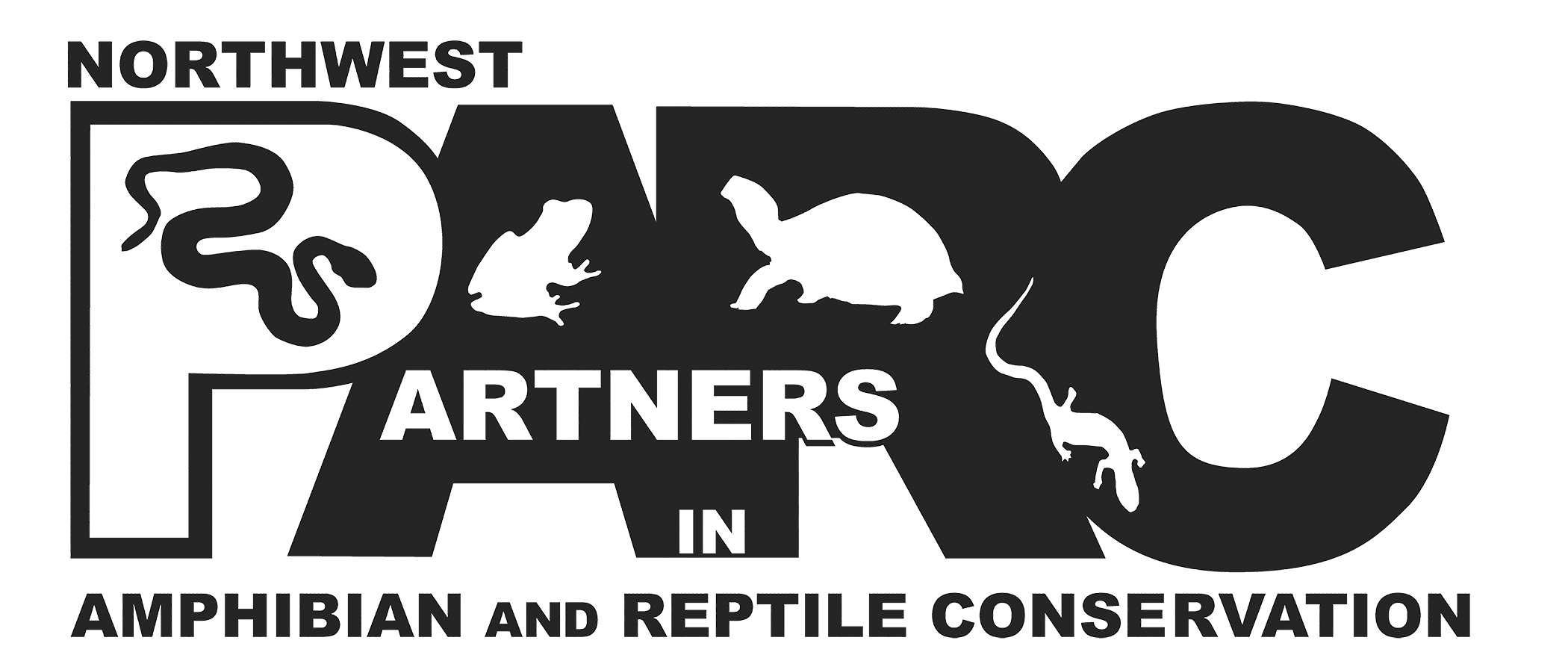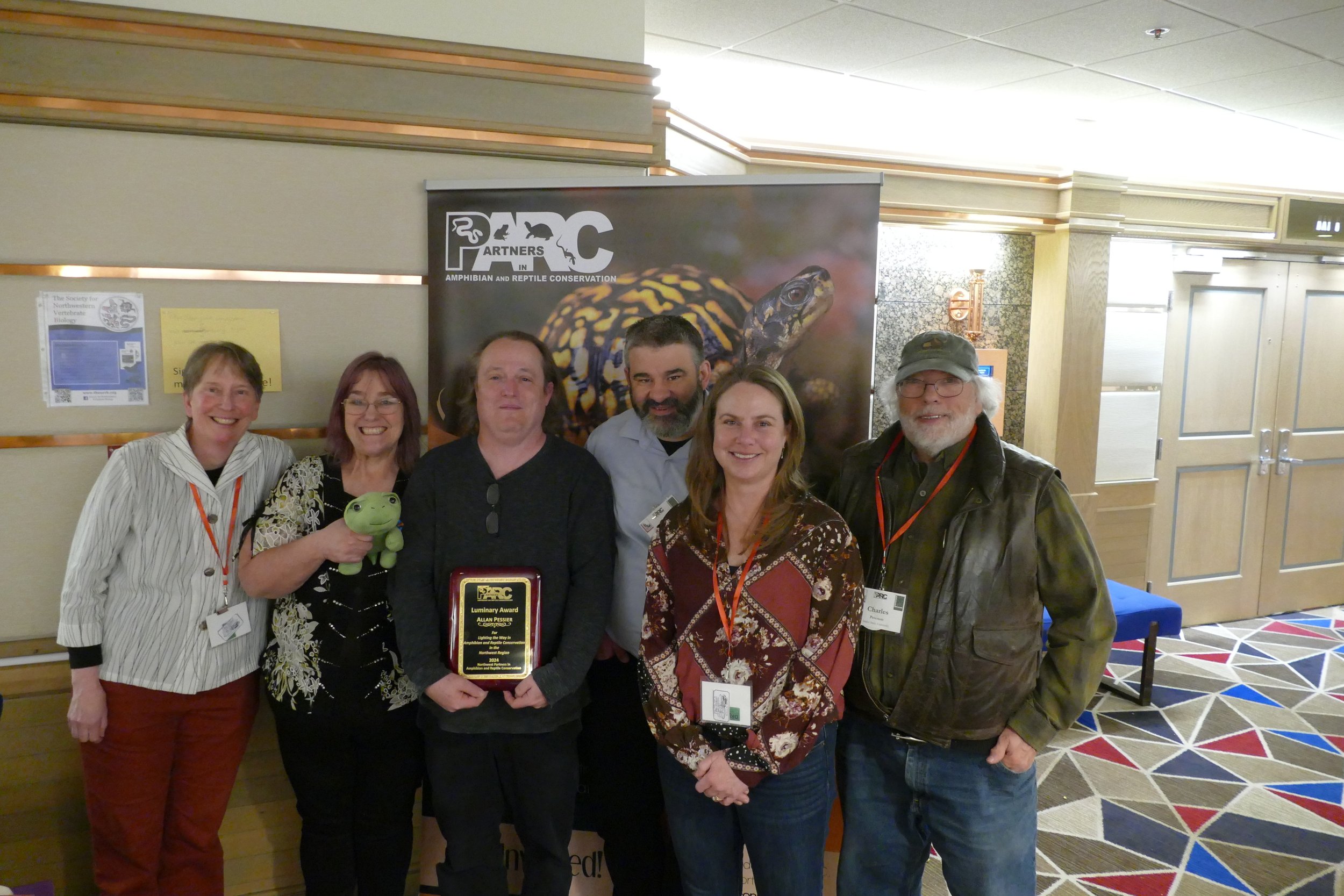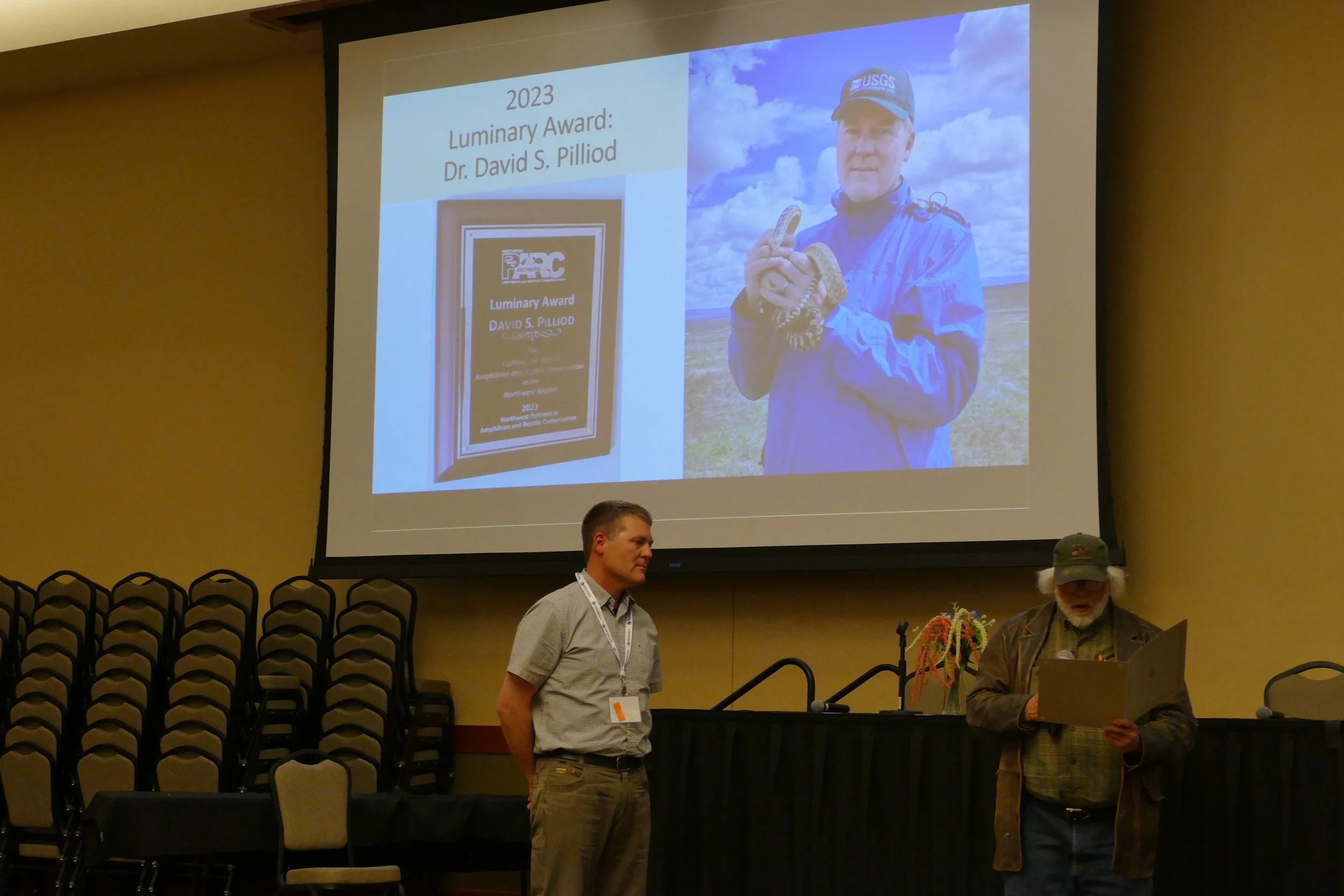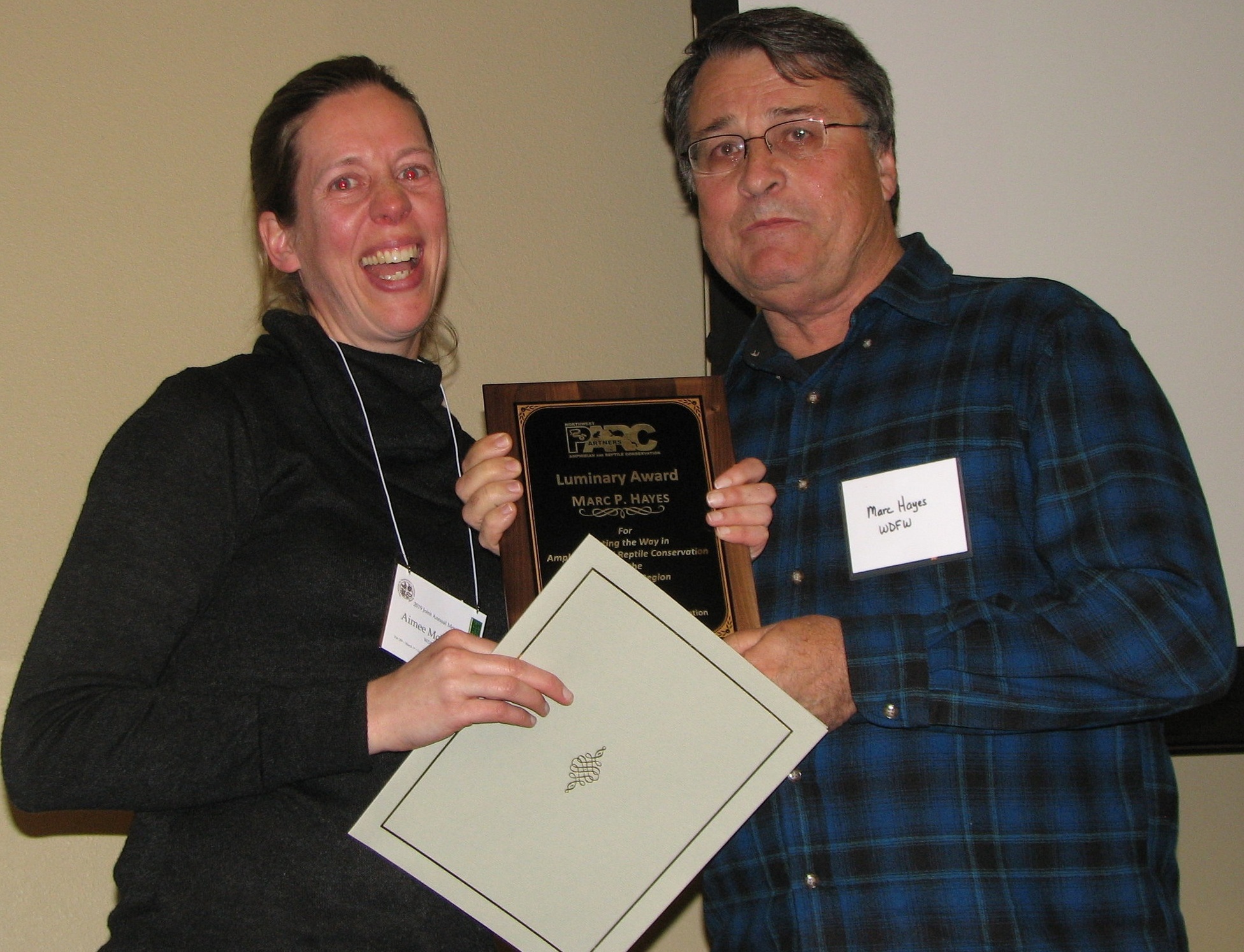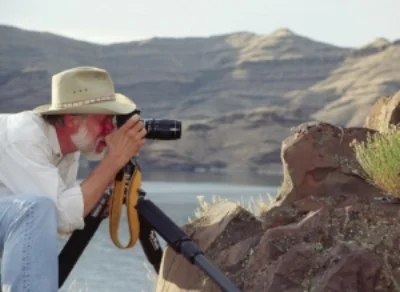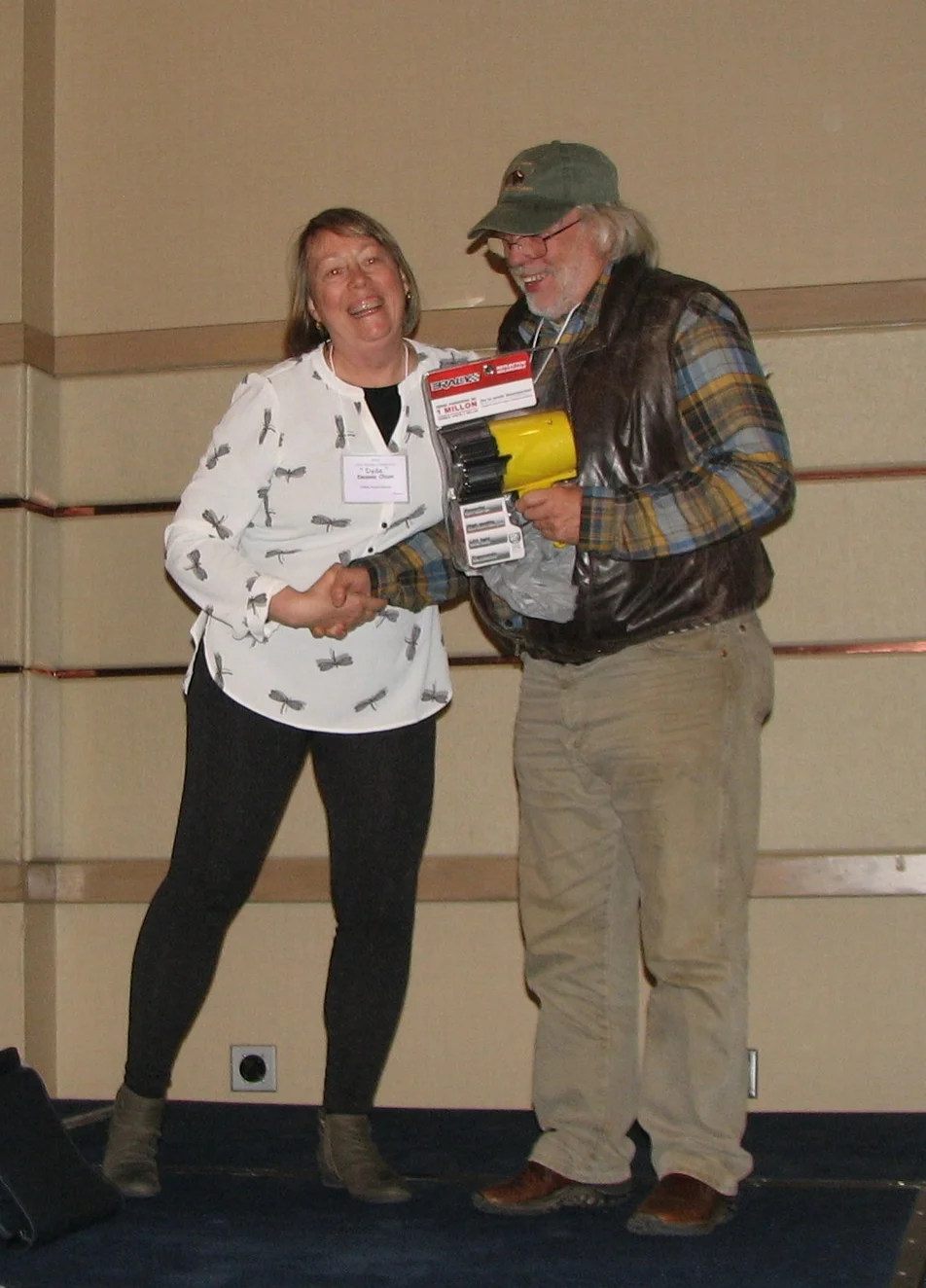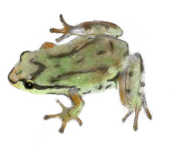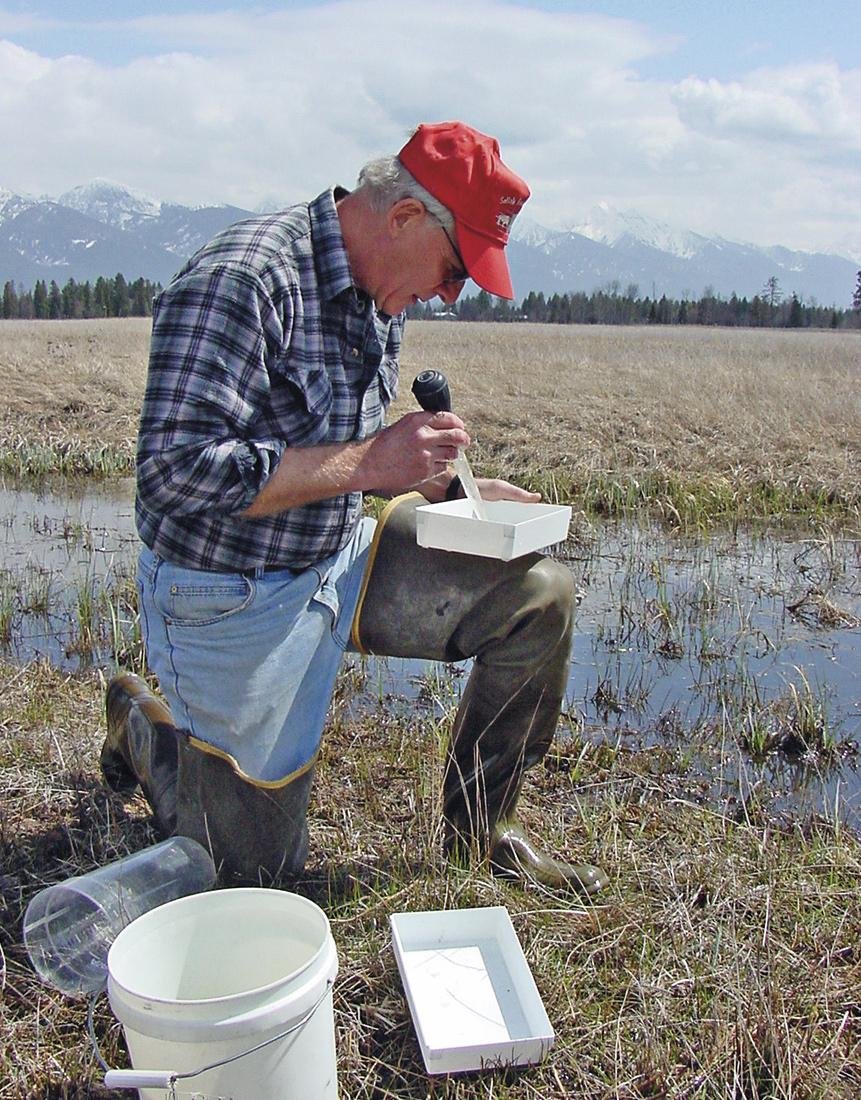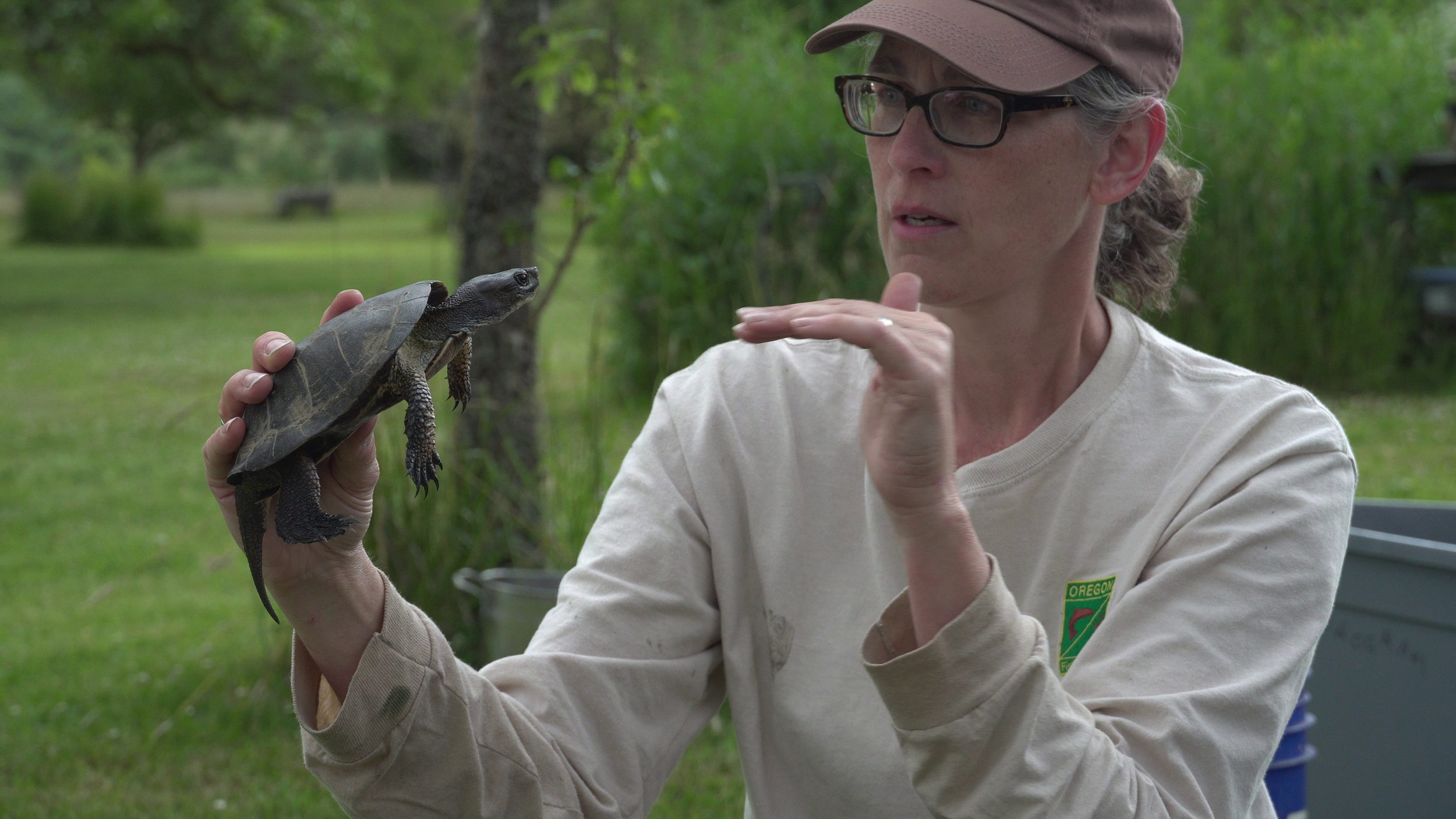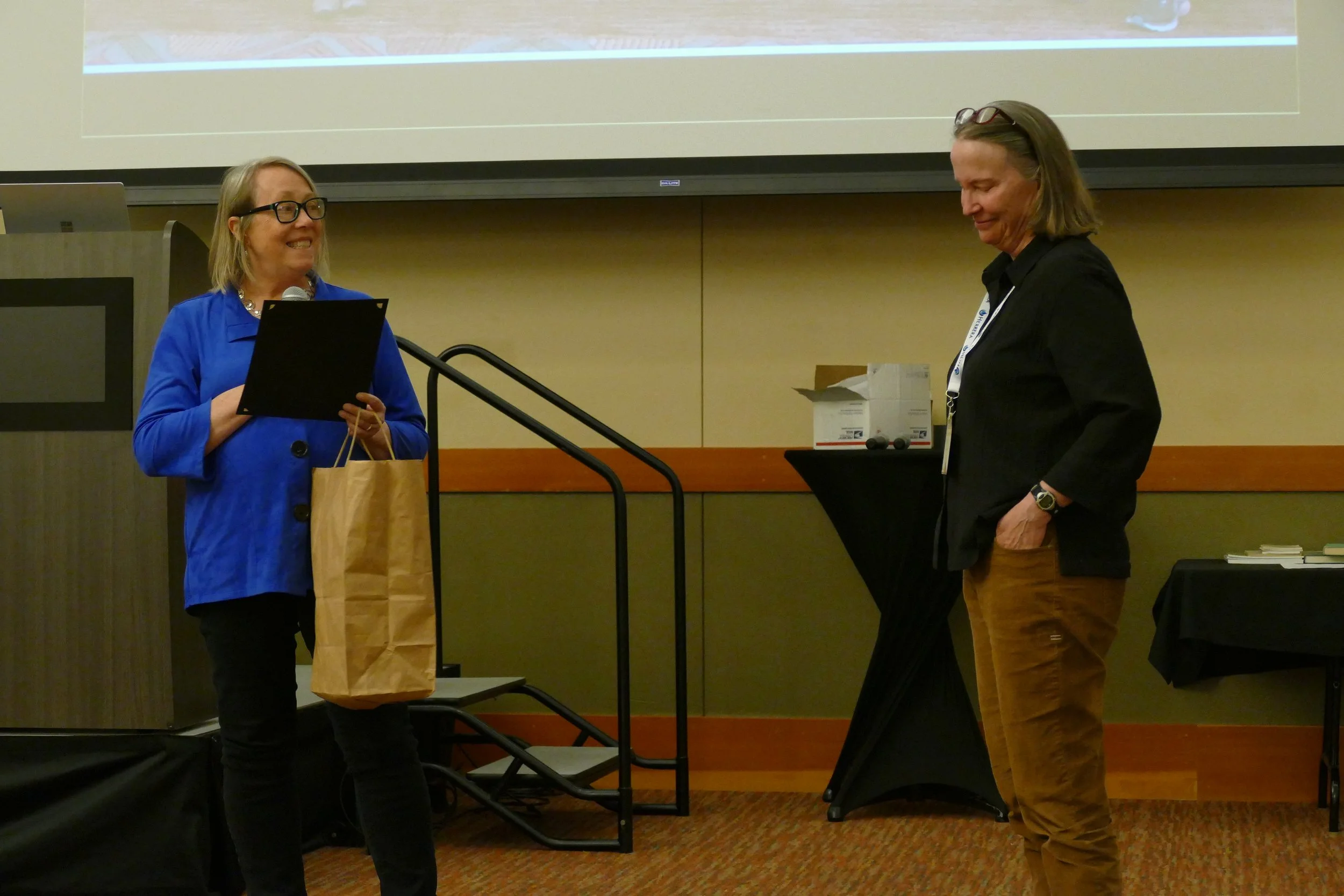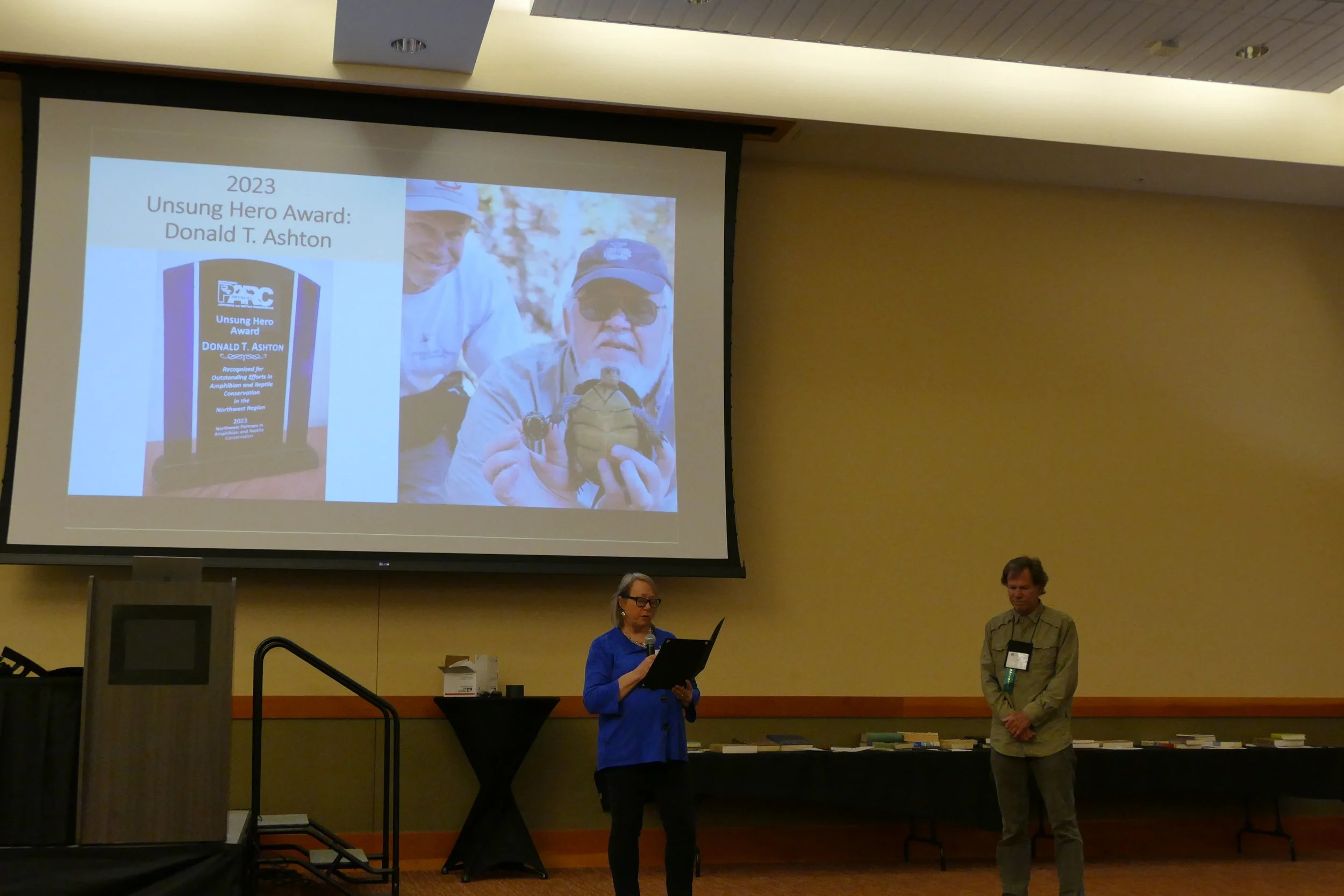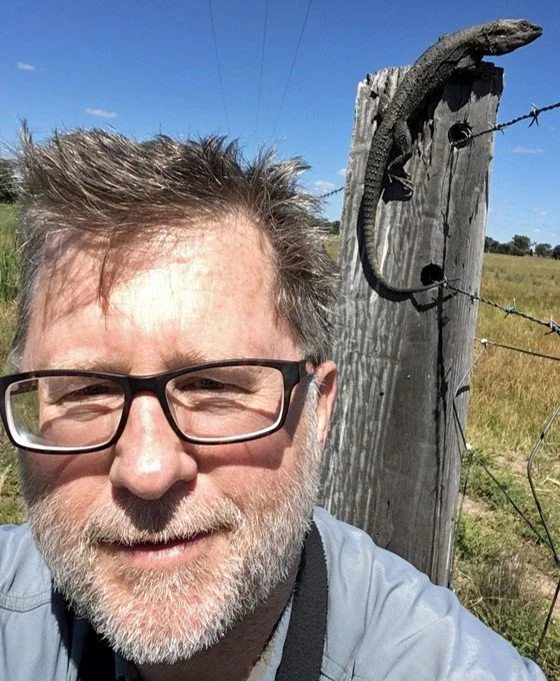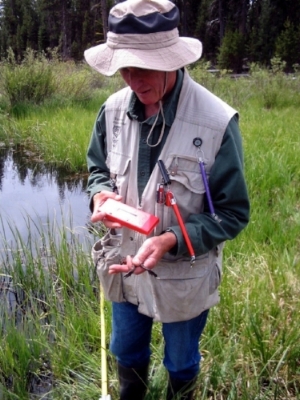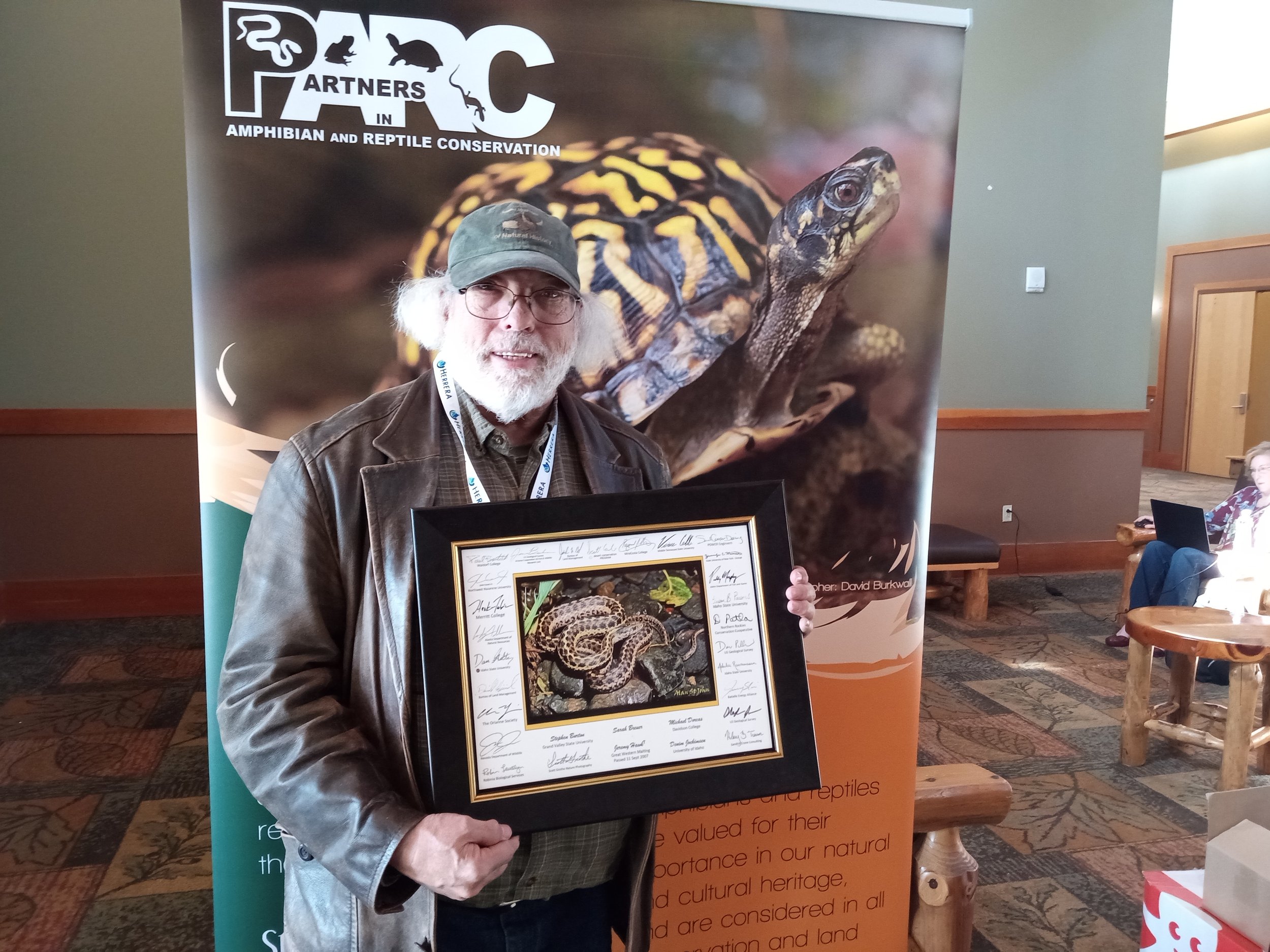Above: Terrestrial Garter Snake © Chuck Peterson
2025 PW PARC Award nominations are now open
Nominations are open for the 2025 Luminary and Unsung Hero Awards. Nominations are open until February 14, 2025. Here is a chance to give that special person that has done so much for the PNW herpetological community the recognition they deserve. The NW PARC Luminary Award recognizes inspiring persons who have been a beacon of light for northwest herpetology and have influenced others in the field of amphibian and reptile conservation. The NW PARC Unsung Hero Award recognizes those individuals who have worked tirelessly over many years in herptile conservation to little or no acclaim yet have still greatly influenced the conservation of many amphibian and reptile species.
If you want to nominate someone for one of these awards, click the buttons below to learn more and get the applications.
The NW PARC Luminary Award
The Luminary Award is presented by the Northwest Chapter of Partners in Amphibian and Reptile Conservation (PARC) to recognize an individual who exemplifies extraordinary leadership, vision, and commitment to amphibian and reptile conservation in the Northwest.
2024 Luminary Award Recipient - Allan Pessier
Allan Pessier (third from left) receiving the 2024 Luminary Award Photo Credit: Betsy Howell
Northwest Partners in Amphibian and Reptile Conservation is proud to recognize Dr. Allan Pessier with the 2024 Luminary Award. As an associate professor at Washington State University’s College of Veterinary Medicine, Alan has been the go-to US West herpetofaunal disease diagnostician for the past 30 years, helping to identify the cause of dead animals in the wild across the region and contributing to the understanding of emerging infectious diseases in amphibians and reptiles. He was a part of the teams that described each of the two amphibian chytrid fungi that cause the diseases Bd- and Bsal-chytridiomycosis, helped to identify the Bd impact in the Neotropics and the US, and the potential Bsal impact in North America, and has addressed herpetological disease treatments and conservation actions for disease biosecurity. In 2008, Alan published his single-authored paper entitled “Management of disease as a threat to amphibian conservation.” From 2010 to 2012he helped spearhead clinical trials for Bd treatments, and in 2017, he was lead author of the manual for control of infectious diseases in amphibian survival assurance colonies and reintroduction programs. In 2021, he set world standards for amphibian reintroductions and translocations (Linhoff et al.). Allan’s life’s work has shed new light on herpetofaunal diseases, crucial work for the future conservation of amphibians and reptiles.
2023 Luminary Award Recipient- David S. Pilliod
David receiving his Luminary Award at the 2023 Joint Conference from Charles Peterson.
Northwest Partners in Amphibian and Reptile Conservation is proud to recognize David S. Pilliod with the 2023 Luminary Award. David has been involved in amphibian and reptile conservation in the Intermountain West and Great Basin for over 25 years. As a supervisory research ecologist with the U.S. Geological Survey (USGS), David leads a team that works to improve understanding of ecological systems and solve challenging problems, including those associated with disease, wildfire, and invasive species. David is a prolific researcher and writer; as a lead or co-author, he has published over 150 papers and contributed an additional 179 papers and posters to various conferences. Working with diverse partners, he has successfully obtained more than 50 grants, contracts, and awards. Apart from his work with USGS, David has been an active member of both Northwest PARC and Idaho PARC. In 2008, he helped found Northwest PARC then served as co-chair from 2009-2013 and has remained on the steering committee ever since. He also co-edited the Northwest Habitat Management Guidelines, a signature document for this area. David’s passion for amphibians and reptiles is clear through his high level of engagement on many different kinds of projects and at many levels in the conservation world.
2022 Luminary Award Recipient- Dr. David F. Bradford
Dr. Bradford the 2022 Luminary Award recipient.
Dr. Bradford’s distinguished career-long contributions have carried amphibian conservation to new heights. His extraordinary leadership, vision and commitment to conserve amphibians through proactive-and-coordinated partnerships is a vision shared with NWPARC.
His multi-decadal leadership of the California/Nevada Amphibian Populations Task Force (APTF), initiated in the early 1990s as part of the global Declining APTF, seeks to understand and reverse amphibian population declines in California and Nevada, and to provide for the continued existence of both declining and non-declining species. A prime objective of the CA/NV APTF is to facilitate communication among individuals who conduct scientific investigations, manage natural resources, or influence conservation policy. Dr. Bradford’s efforts in this regard are notable; for example, in the month of December 2021, CA/NV APTF members received 11 emails from David about amphibian-related news, publications, and jobs. NWPARC and CA/NV APTF overlap in northern California, with overlapping membership as well.
Dr. Bradford’s leading-edge research contributions to amphibian conservation, >50 publications with >2,400 citations, have afforded him scientific stature-and-impact regionally and internationally. His Ph.D. in 1982 addressed the ecological physiology of Rana muscosa in the Sierra Nevada. By 1990, his concerns had focused on declining amphibian population contexts as he had witnessed losses firsthand. He was quoted in a 1990 New York Times article titled Scientists confront an alarming mystery: The vanishing frog: “The real mystery is what might be killing frogs in pristine environments...last summer Dr. Bradford revisited 38 lakes in the High Sierra and the frogs “were gone in all but one”.:” As a research scientist for the US EPA in Las Vegas, his studies spanned several amphibian threat factors including non-native fishes, atmospheric pesticide deposition and chemical contaminants. Continuing to advance science today in retirement, he is the Co-Editor of the journal Herpetological Conservation & Biology.
2019 Luminary Award Recipient-Marc P. Hayes
Aimee McIntyre presented Marc Hayes with his award. Marc was very surprised and consequently speechless!
Northwest Partners in Amphibian and Reptile Conservation is proud to recognize Marc P. Hayes with the 2019 Luminary Award. Marc, currently a Senior Research Scientist with the Washington Department of Fish & Wildlife employee, received his Master’s in Herpetology in 1983 and his Ph.D. in Herpetological Ecology in 1991. After earning his doctorate, he moved to the Pacific Northwest and has been a cornerstone of herpetofaunal conservation here ever since. Marc’s work in the region began with an ambitious range-wide survey of Rana pretiosa, a project that resulted in three decades of intensive study and conservation by multiple entities and culminated in the species receiving federal protection under the ESA. Over the years, he has been crucial in research, mentorships, and partnerships, developing successful grant proposals to support herp-related research and conservation totaling millions of dollars. Marc has contributed over 70 publications to the peer-reviewed literature, and served tirelessly on many diverse scientific panels and working groups. He has also been an associate editor for herpetology journals, mentored over 70 graduate students and worked as adjunct faculty at The Evergreen State College.
Alan St. John in his element. Photo credit: Alan St. John
2018 Luminary Award Recipient—Alan St. John
Northwest Partners in Amphibian and Reptile Conservation is proud to recognize Alan St. John with the 2018 Luminary Award. In addition to helping pioneer field studies of reptiles and amphibians in Oregon and throughout the region, Alan’s prose and photography skills are on display in the books “Reptiles of the Northwest” and “Oregon’s Dry Side.” Both of these publications demonstrate a lifetime of achievement condensed into two valuable resources for lay people and professionals alike. A vanishing breed in a changing world, Alan is a true naturalist and his relentless passion for the flora and fauna of our region is contagious.
2018 Luminary Award Recipient—R. Bruce Bury
R. Bruce Bury being presented the Luminary Award at the 2018 Annual Meeting.
Northwest Partners in Amphibian and Reptile Conservation is proud to recognize Bruce Bury with the 2018 Luminary Award. Bruce has devoted much of his life to advancing our understanding of the ecology and conservation of Pacific Northwest amphibians and reptiles. During his long career studying herpetofaunal ecology, he has especially contributed to a deeper understanding of our regional: stream-breeding amphibian assemblage, especially tailed frogs; woodland salamanders, and their phylogeography; and turtles, in particular his beloved western pond turtle on which he has conducted five decades of research. Bruce has led the call for western pond turtle conservation and has also been a key contributor to a wealth of studies advancing the ecology and conservation of desert tortoises. With his regional roots, he has grown to have world-wide impact for amphibians and reptiles.
2017 Luminary Award Recipient—Hartwell H. Welsh Jr.
Hartwell Welsh being presented the Luminary Award at the 2017 Annual Meeting.
The 2017 Luminary Award is presented to Hartwell H. Welsh Jr. by the Northwest Chapter of Partners in Amphibian and Reptile Conservation. Hart has made career-long contributions to the conservation of amphibians, reptiles, and their habitats. He is regarded as an expert of many amphibian and reptile species, and has studied the use of amphibians as indicators of terrestrial and aquatic ecosystem health and recovery. A recent study of his revealed that woodland salamanders perform a vital ecological service in forests by slowing the release of carbon into the atmosphere. Hart has developed habitat models for many forest amphibians and reptiles of the Pacific Northwest to help managers under-stand habitat requirements and to address stressors such as timber harvest and water diversions. Hart worked for 30 years for the U.S. Forest Service and also held an adjunct faculty position for 25 years in the Department of Wildlife at Humboldt State University, where he mentored many graduate students over the years.
2016 Luminary Award Recipient—Chuck Peterson
Dede Olson and Chuck Peterson at the 2016 Annual Meeting (Photo by Betsy Howell)
Dr. Charles R. (Chuck) Peterson of Idaho State University is the first recipient of NW PARC’s Luminary Award. Chuck has been a beacon of light for Northwest herpetology for over 40 years. He has focused much of his work on the ecology and conservation biology of amphibians and reptiles of the Intermountain West. Across the Northwest, he is the sole remaining academic herpetologist in the classic style, devoted to field ecology and natural history studies. He has a sincere passion for the animals he studies, and that enthusiasm has been infectious for the scores of students he has influenced over the years. He initiated one of the first State Chapters of Partners in Amphibian and Reptile Conservation in Idaho, and continues to lead the Idaho Chapter, bringing the little known amphibians and reptiles to the forefront for consideration by natural resource managers and scientists.
Chuck arrived at Washington State University for his Doctorate in 1974. After a stint as a Post-Doc at the University of Chicago, he returned to the West when he became an Assistant Professor at Idaho State University (ISU) in 1988, where he remains today as a Professor of Zoology. He also is Curator of Icththyology and Herpetology at the Idaho Museum of Natural History. Throughout his long career, he has authored numerous significant journal articles and has coauthored a book on regional herpetofauna. He has been recognized for his impact in the field of herpetology previously: he received the Outstanding Herpetologist award from the Idaho Herpetological Society in 1997, the Professional Wildlifer Award from the Idaho Chapter of the Wildlife Society in 1998, an ISU outstanding researcher award in 1999, an ISU outstanding public service award in 2000, the ISU distinguished public service award in 2001, and an ISU outstanding researcher award in 2002. Chuck is an inspiration to us all and is well-deserving as the inaugural recipient of the Northwest PARC Luminary Award.
The NW PARC Unsung Hero Award
The Unsung Hero Award recognizes those individuals who have worked tirelessly over many years in herptile conservation to little or no acclaim, yet have still greatly influenced the conservation of many amphibian and reptile species. Unsung Heroes are those people who work in this field because they care deeply and want to see a future where all species are valued.
2024 Unsung Hero Award Recipient-Confederated Kootenai & Salish Tribal Wildlife Management Program
Kirwin Werner of the Confederated Salish and & Kootenai Tribes in the field. Photo credit: Julie Lue
Northwest Partners in Amphibian and Reptile Conservation is proud to recognize the Confederated Salish & Kootenai Tribes Wildlife Management Program with the 2024 Unsung Hero Group Award. In 2003, when the Tribes began work to restore populations of northern leopard frogs, the species had not been documented on the Flathead Indian Reservation since 1980. Working with other Tribes that still had northern leopard frog populations, the CWKT were able to collect and translocate 26 egg masses over the next 4 years. Although tadpoles metamorphosed, the project didn’t document significant overwintering survival. In 2006, another 128 egg masses were translocated to a nearby recently restored wetland along the Little Bitterroot River. Overwintering survival was confirmed in 2008 and adult frogs were first heard calling in 2010. A major milestone occurred in 2013 when the first egg masses were documented, ten years after the project began and more than 30 years since the last documented breeding of leopard frogs on the Reservation. Since then, the number of egg masses has increased and future plans include continuing to translocate egg masses into the Little Bitterroot River wetland and additional nearby wetlands to diversify breeding sites within the localized population. Successful conservation often requires years-long efforts, and the Tribes have shown great dedication and tenacity in restoring populations of northern leopard frogs to the Flathead Indian Reservation.
2024 Unsung Hero Award Recipient - Susan Barnes
Susan Barnes recipient for the 2024 Unsung Hero Award Photo Credit: Adam Baylor
Northwest Partners in Amphibian and Reptile Conservation is proud to recognize Susan Barnes with the 2024 Unsung Hero Award. For the past 20 years, Susan has been the picture of an unsung hero in her role as a non-game biologist for Oregon Department of Fish and Wildlife. In addition to her duties associated with birds and mammals, Susan has been an instrumental leader in supporting Willamette Wildlife Mitigation Program’s efforts to acquire or protect wetland habitats for at-risk herp species, worked to establish Oregon’s first non-game crossing structure for northern red-legged frogs on Highway 30, and helped to implement an annual “frog taxi” event at this site, which involves working with hundreds of volunteers to manually transport frogs across the highway. Susan has worked to develop Oregon’s protected species rules and she also advises on mitigation measures for development and land use proposals to limit harm to herps. For northwestern pond turtles, Susan helped to develop Oregon’s Best Management Practices for the species, coordinated recent state-wide survey work to assess occupancy, worked with partners to create a new community science turtle data submission platform, and currently leads monitoring and restoration efforts for several populations. In addition to all this, she is a frequent herp educator serving internal and external partners, local schools, universities, and underserved communities. Susan’s passion for conservation has touched the lives and careers of generations of biologists.
2023 Unsung Hero Award Recipient - Betsy L. Howell
Betsy receiving the 2023 Unsung Hero award at the Joint Conference by Dede Olson.
Northwest Partners in Amphibian and Reptile Conservation is proud to recognize Betsy Howell with the 2023 Unsung Hero Award. Betsy has been an important behind-the-scenes herpetofaunal conservationist with her three long-term roles. In 1986, Betsy was hired as a US Forest Service Wildlife Biologist, tending to surveillance and management of a variety of sensitive forest wildlife species inclusive of herpetofauna in Oregon and Washington; she continues this work today on the Olympic National Forest, Washington. Since 2008, Betsy has been a key leader in formulating NW PARC’s direction as a past Co-Lead, Treasurer, and Awards committee member. In particular, as Treasurer, Betsy has provided a key liaison role with our partner non-profit organization, the Amphibian and Reptile Conservancy, and our annual meeting partner societies. Interwoven with her day-job and her NW PARC activities, Betsy is a passionate writer. She has published numerous natural history articles in magazines aimed at public and natural resource management audiences; her articles include insights of our national herpetofauna, raising awareness of their conservation needs. Through these three roles, Betsy has shown long-term, extraordinary commitment to the broader PARC mission of conserving amphibians, reptiles, and their habitats as integral parts of our ecosystem and culture through education, inventory and monitoring, habitat improvements, and formulating policy.
2023 Unsung Hero Award Recipient - Donald T. Ashton
Donald receives the 2023 Unsung Hero Award from Dede Olson
Northwest Partners in Amphibian and Reptile Conservation is proud to recognize Don Ashton with the 2023 Unsung Hero Award. Don has been involved in reptile and amphibian conservation since the 1990s. A consulting herpetologist since 2008 with Applied River Sciences, Inc., in Arcata, CA, Don’s research focuses on the impacts of dams and regulated river flows on western pond turtle and foothill yellow-legged Frog (FYLF) populations. He has done a tremendous amount of conservation work on pond turtles, including as the lead on a conservation plan for the species in California, and as one of four coauthors and author on many chapters in the 2012 publication, Western Pond Turtle: Biology, Sampling Techniques, Inventory and Monitoring, Conservation, and Management. Don has also published several scientific papers, news notes, and major reports and volunteers his time to review assessments of species proposed for Federal listing, including both FYLF and NWPT in recent years. He is always willing to share his time, knowledge, and expertise with colleagues and students, reminding people with his example that we are in this profession to do our best to conserve wildlife species.
2022 Unsung Hero Award Recipient- Gary Nafis
Gary Nafis the 2022 Unsung Hero Award recipient
More than 19 years ago, Gary Nafis created, and has since managed, the universally accessible, user-friendly, accurate, and up-to-date resource on Pacific Coast amphibians and reptiles (http://www.californiaherps.com).
He has spent thousands of hours of his life working on it, his own money hosting and maintaining it, and his own effort researching (in both literature and real life) the subjects therein. Gary has no formal training, but his knowledge of amphibian and reptile distribution and life history is extensive, and he shares this knowledge generously with anyone who clicks on his page. Gary has also been a friend and mentor to countless budding herpetologists, amateur and professional herpers, and nature enthusiasts. Gary is a coach, a mentor, and a confidant, and he is constantly making connections between folks he thinks would benefit from knowing each other.
2019 Unsung Hero Award Recipient-Charlie Justus
Unfortunately, Charlie Justus couldn’t attend this year’s meeting, but we still shared his many accomplishments with everyone.
Northwest Partners in Amphibian and Reptile Conservation is proud to recognize Charlie Justus with the 2019 Unsung Hero Award. Charlie has been a champion for Idaho’s amphibians and reptiles for the last three decades. He has spent most of his career in law enforcement, protecting Idaho’s amphibians and reptiles and educating people about the animals’ biology, habitats, and value to the state of Idaho. Charlie helped develop the rules for collection, possession and permitting for amphibians and reptiles in Idaho, and in 2006 he assisted the USFWS in stopping the illegal collection, housing, and trade of reptiles in Idaho under “Operation Sneaky Snake.” Charlie continues to demonstrate a love for field observations and he is one of the top contributors of herps to Idaho iNaturalist. Throughout his career Charlie has displayed an extraordinary commitment to the PARC mission of conserving amphibians, reptiles, and their habitats through education, observation, law enforcement and policy.
2019 Unsung Hero Award Recipient-James B. Bettaso
Bruce Bury presented Jamie with his award and Katy Weil, current NW PARC co-chair, gave Jamie a congratulatory hug.
Northwest Partners in Amphibian and Reptile Conservation is proud to recognize James B. “Jamie” Bettaso with the 2019 Unsung Hero Award. Jamie is a mid-career biologist who carries out his daily tasks as a District Wildlife Biologist for the Forest Service. Though much of his time is spent supporting other departments within the agency, Jamie is consistently involved with numerous projects on rare and endangered species, or contaminant issues, especially related to amphibians and reptiles. Jamie is recognized as one of the few experts on the ecology and status of two species now proposed for Federal listing: Western Pond Turtles and Foothill Yellow-legged Frogs. He attends meetings far and wide about information gaps, and freely provides key field data and observations. Some travel is covered by his agency, but he also attends meetings on his own time and nickel. Jamie’s dedication to protecting wildlife resources is clearly evident, as is his role as an Unsung Hero.
2018 Unsung Hero Award Recipient- Jay Bowerman
Jay Bowerman - hard at work
Northwest Partners in Amphibian and Reptile Conservation is proud to recognize Jay Bowerman with the 2018 Unsung Hero Award. Jay has advanced the field of Northwestern amphibian biology in a multitude of ways, including research into frog parasitology and limb deformities, the occurrence of the amphibian chytrid fungus, and potentially using chemicals to treat amphibians with chytrid. Jay has also worked extensively with Oregon spotted frogs, contributing to an understanding of the demographics, movements, and thermal biology of the species. Additionally, Jay is an avid educator, mentoring anyone who shows the slightest glimmer of curiosity about amphibians. Jay has been a constant advocate for amphibians and collaborates with a wide range of people and organizations to better understand and protectthem.
2018 Unsung Hero Award Recipient-Elke Wind
Elke Wind (l) with Dede Olson at Awards Ceremony.
Northwest Partners in Amphibian and Reptile Conservation is proud to recognize Elke Wind with the 2018 Unsung Hero Award. Elke is a conservation biologist who is making a difference for Northwest amphibians and reptiles through passion, dedication, sound science, and ducation. She is a founding co-chair of NW PARC and served two terms in that capacity. Elke also coauthored the 2008 “Habitat Management Guidelines for Amphibians and Reptiles of the Northwestern United States and Western Canada,” and continues as an active NW PARC Board member, with particular leadership in field training sessions and annual meeting organization.Leading by example, Elke has spent over 20 years building, nurturing, and inspiring partnerships in the Northwest for the purpose of conserving wetland biodiversity and herpetofauna.
2017 Unsung Hero Award Recipient- Char Corkran
NW PARC co-chair Katy Weil presenting Char Corkran with her award
Char Corkran, from Portland, Oregon, has been a passionate force for Northwestern amphibian and reptile conservation for over 30 years. As a naturalist she is unparalleled, and has worked with numerous partner groups to foster herpetofaunal inventory and monitoring trainings and programs, habitat restoration projects, and educational products. Her extensive experience and understanding of amphibians led her to write, with co-author Chris Thoms, the 1996 Amphibians of Oregon, Washington, and British Columbia: A Field Identification Guide, an indispensable resource. Char developed a well-known training program for identifying pond-breeding amphibians and she has similarly influenced Western pond turtle monitoring in the region. Additionally, she helped to organize a local nonprofit, the Northwest Ecological Research Institute (NERI, 1984−present), which has been and continues to be an essential mechanism for the implementation of herpetological surveys.
2017 Unsung Hero Award Recipient- Debra Patla
Debra Patla with her Unsung Hero Award
Debra Patla, of Moran, Wyoming, has dedicated herself for nearly three decades to amphibian conservation in the Greater Yellowstone Area (GYA). Then and today, she is regarded as a fervent conservationist. Deb has maintained meticulous records on amphibian breeding and disease-related mortality and co-authored an interagency amphibian monitoring protocol used throughout the northern Rockies. Deb may be best known for her long-term monitoring of Columbia spotted frogs in the Lodge Creek drainage of Yellowstone – a study that followed Dr. Fred Turner’s painstaking research on the natural history of the species. Deb’s leadership in amphibian research and conservation has helped cultivate partnerships among state and federal agencies, and she is considered the champion and voice for amphibian conservation in the GYA.
Special Recognitions
2023 Lifetime Achievement Award – Chuck Peterson
Dr. Charles Peterson with the Lifetime Achievement Award from the Snake Ecology Symposium.
Dr. Charles R. Peterson was presented with a Lifetime Achievement Award after the Snake Ecology Symposium. Chuck received his BS and MS degrees in Zoology at the University of Illinois-Urbana (1971, 1974), his PhD in Zoology at Washington State University (1982), and conducted his postdoctoral work at the University of Chicago (1983-1988). He began working at Idaho State University in 1988 and is currently an Emeritus Professor of Zoology in the Department of Biological Sciences and the Affiliate Curator of Herpetology for the Idaho Museum of Natural History. Chuck's current teaching responsibilities at ISU include Herpetology and Nature Photography. He has had five PhD, four DA and 20 master's students complete their degrees under his supervision, and his research interests include the spatial, physiological, and conservation ecology of amphibians and reptiles. Most of Chuck’s work has focused on amphibian and reptile populations in the Northern Intermountain West. He is currently working on community science projects utilizing the iNaturalist mobile application to document the distribution and activity of amphibians and reptiles in Idaho and the Greater Yellowstone Area. Chuck is an avid nature photographer and seeks to use his photography to conserve and restore amphibian and reptile populations and their habitats (https://www.flickr.com/photos/petechar/). Chuck’s award includes a photograph (by Alan St. John) of one of his favorite snakes, the Western Terrestrial Garter snake, as well as the signatures of his many students over the years. Marc Hayes, retired Senior Research Scientist from Washington Department of Fish & Wildlife and currently a freelance Ecological Research Scientist, and David Pilliod, Supervisory Research Ecologist with U.S. Geological Survey, organized this award for Chuck.
In Memoriam—Lowell Diller
Lowell Diller
This year, NW PARC wanted to honor the life and work of wildlife biologist and professor, Lowell Diller, who passed away in March 2017. Lowell worked with many different species during his long career, including amphibians, fishers, red-backed voles, and spotted owls. He worked hard to understand the many intricate systems and linkages at play in northern temperate rainforests. Over the years, he had a tremendous positive influence on students, colleagues, and the general public. The species of the earth are better for Lowell’s commitment, and his work and spirit will live on. NW PARC has donated to the Lowell Diller Wildlife Scholarship Endowment, https://alumni.humboldt.edu/giving/lowell-diller-endowment.
